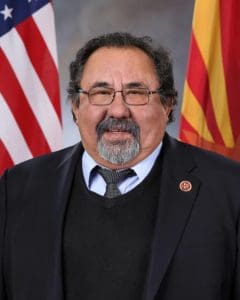
Two key representatives in the U.S. House of Representatives have begun an inquiry into the federal government’s decision to cancel the study of a proposal to block mining in the Boundary Waters watershed. The change in course was made in early September.
In a letter earlier this month to the Secretaries of Agriculture and Interior, Reps. Betty McCollum (D-MN) and Raul Grijalva (D-AZ) asked for documentation of how the Trump appointees decided to abruptly halt the study and reopen the area to mineral exploration and mine development.
Proposals to mine copper and other metals in the wilderness watershed have raised concerns about the possibility of water pollution and other environmental harm to the Boundary Waters and surrounding areas.
McCollum and Grijalva pointed out that there were numerous questions about how the executive branch justified the decision. The U.S. Department of Agriculture (USDA), which includes the Forest Service, only announced the cancellation through a press release, and did not release any of the information usually included when making such a decision.
“USDA discontinued the environmental review, which had been underway for 20 months, without releasing any findings or addressing the substantive public commentary,” McCollum and Grijalva wrote. “This action and the Bureau of Land Management’s subsequent decision to cancel the withdrawal application ignored the science-based decision-making and conservation-based management standards to which your agencies are legally bound.”
Initiating an investigation

In its announcement, the USDA cited “a mineral resources report, a biological and economic impact assessment, and potential impacts to water resources, wilderness areas, and cultural resources.” It also cited public input, and said the review had not revealed any new scientific information.
The Representatives are asking for evidence for all those claims. In the letter sent Nov. 5, they requested documentation to back up the statements. They also asked for details about all meetings on the topic, including dates and participants. Previous work by journalists and transparency activists using Freedom of Information Act requests has traced the process of overturning the withdrawal, saying it was a top priority as soon as President Trump’s administration began to work in early 2017.
McCollum and Grijalva sent their letter on Nov. 5 and requested a response with documentation within 14 days. While they do not have the ability to legally compel the agencies to produce the information, that may soon change.
While the Natural Resources Committee has issued no subpoenas in the past two years while under Republican leadership, recent Democratic victories in the midterm election will return the party them to positions of authority in the chamber.
McCollum and Grijalva are both on the House Committee on Natural Resources. Grijalva is the ranking member, and expected to become the committee’s chair in January when Democrats return to the majority. McCollum is ranking member of a subcommittee that oversees appropriations for the Department of Interior and related agencies, and could become chair.

